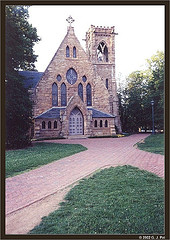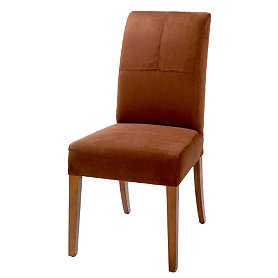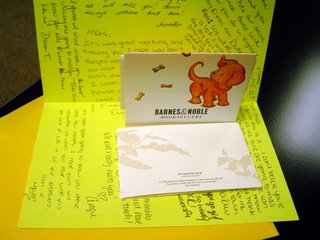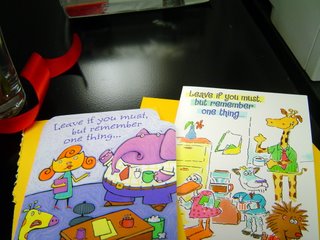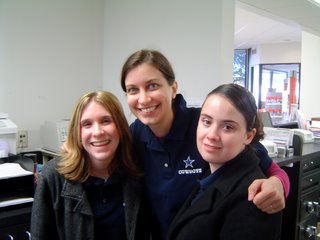Yesterday I was listening to
this NPR story, which is about giving real presents versus money/ gift cards, and it really made me think about gifts, what we give, and why they matter. Because, they
do matter.
Apparently, economists have long argued that giving cash is much more efficient ("better") because when buying a present we either get exactly what the receiver would have bought with the cash, or else get something they would not have bought, and therefore don't really want, therefore rather wasting the money that would have better been given as cash.
This is basically nonsense, though, as
the guy on the radio pointed out. First of all, why assume that I would buy myself nice things if I had cash? I've got bills to pay, some debt to deal with, a house to save for. If someone gave me fifty dollars as a gift, most likely I'm not going to buy something fabulous with it, I'm going to spend it on next month's rent and electricity or else sock it into savings. That doesn't mean that I would value cash more, just that the economists don't take into account the complicated relationships people have with money. For example, when I graduated from college, my parents bought me a piano, which is the nicest thing that I own. It's a beautiful upright, shiny black, that dresses up the whole room and makes me want to take lessons again . . . It's a completely frivolous, impractical, luxury item, and I love it. I would never have bought myself a piano, though, if they had just handed me a wad of cash or a check, instead. I would have to be in a place financially in which
everything else was taken care of, before I could ever, ever spend a big chunk of money on something like that. Gifts are often a luxury that we would not buy for ourselves.
Secondly, (and this was the main point that this new study makes) people value gifts, whatever they may be, especially
because they're gifts. So what if I would never have bought yourself that paticular coffee mug-- Aunt Sue gave it to me and therefore I love it! This contradicts the either-it's-perfect-or-else-a-waste-of-money idea that the economists go by. Gifts gain in value simply by being
given. You can't put a price on that warm fuzzy ya get from looking at or using a gift that was given by someone you care for, whether or not it was originally something you'd buy yourself.
Personally, I have a hard time parting with
anything that was given to me. I'm especially noticing this now, because with this un-friend-ing thing that I'm going through; I've noticed more and more things that I have that were gifts from her, that I've held on to for years and years just because... can't get rid of gifts! Ever! Now, as we're still unpacking boxes (the stuff not necessary for day-to-day life like photos and knickknacks) I realize that I've held onto every gift and card that she ever gave me, like this purple ceramic...
thing made in 7th-grade art class that has been at various times a flowerpot, a colored-pencil holder for my desk, and a spatula-and-spoon holder on my kitchen counter. It has that lumpy, endearing, hand-made look that usually only moms love, but I was so fond of it because it always reminded me of my friend, and since it was from seventh grade, it always made me think of how long we'd been friends... now thinking about that is painful, and I'm still trying to decide whether to keep this thing or not. That's the power of gift-giving, though. It creates something precious out of a lumpy, sparkly-purple ceramic thing that you wouldn't buy for a quarter at a garage sale.
The thing is, gifts say something about the relationship between the giver and the givee.
"I know you, and know what you'd like".
"I love you, and want you to have something nice".
"I don't know what I'm doing, but at least I'm trying. "
"I'm your mother and want you to have warm feet."
Exchanging gift cards--or cash-- doesn't really express a
relationship the way that gifts do. Time and thought go into gift-purchasing or -creating. My mom gives me socks every year for Chanukah, sometimes pajamas and things, and it means a lot to me. Sure, she could give me 50 bucks or a Target gift card and I could go out and buy some socks, but the gift expresses something more than its cash value.
In
Harry Potter, Dumbledore doesn't want
socks in the first book, when asked what he sees in the Mirror of Erised that shows the heart's desire. Obviously he could go out and buy
socks-- the thick, woolen socks that he mentions to Harry. What Dumbledore wants is
to be given socks. His heart's desire is not for footwear (which apparently confused some readers) but for the kind of loving relationship that would result in a gift of socks. After all, who would give an old man (even a great, powerful, old man) socks? Who gives a gift that says, "I care about your personal comfort and warmth", a gift like the handmade sweater that Harry just received from Molly Weasley? A wife, a daughter, a grandchild? All Dumbledore ever got was books.
 Do you know what this thing is? It's some kind of interesting combination between stuffed animal doggie and blankie. I was eating lunch yesterday at Bodo's Bagels, reading the paper, minding my own business. When this baby--for no apparent reason--toddled up to me, eyed me seriously for a moment, and handed me his... doggie-blanket-thingie. Not in a dismissive I'm-finished-with-this-now way, but very earnestly; it was as though he had decided that out of all the good folk eating their lunch at Bodo's, I alone could truly appreciate the specialness of a well-chewed blankie.
Do you know what this thing is? It's some kind of interesting combination between stuffed animal doggie and blankie. I was eating lunch yesterday at Bodo's Bagels, reading the paper, minding my own business. When this baby--for no apparent reason--toddled up to me, eyed me seriously for a moment, and handed me his... doggie-blanket-thingie. Not in a dismissive I'm-finished-with-this-now way, but very earnestly; it was as though he had decided that out of all the good folk eating their lunch at Bodo's, I alone could truly appreciate the specialness of a well-chewed blankie.
